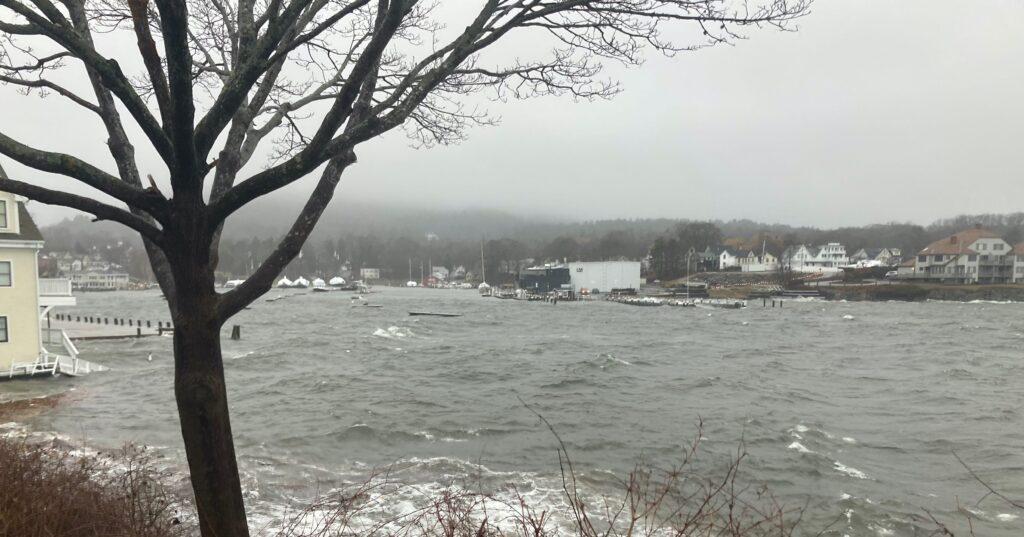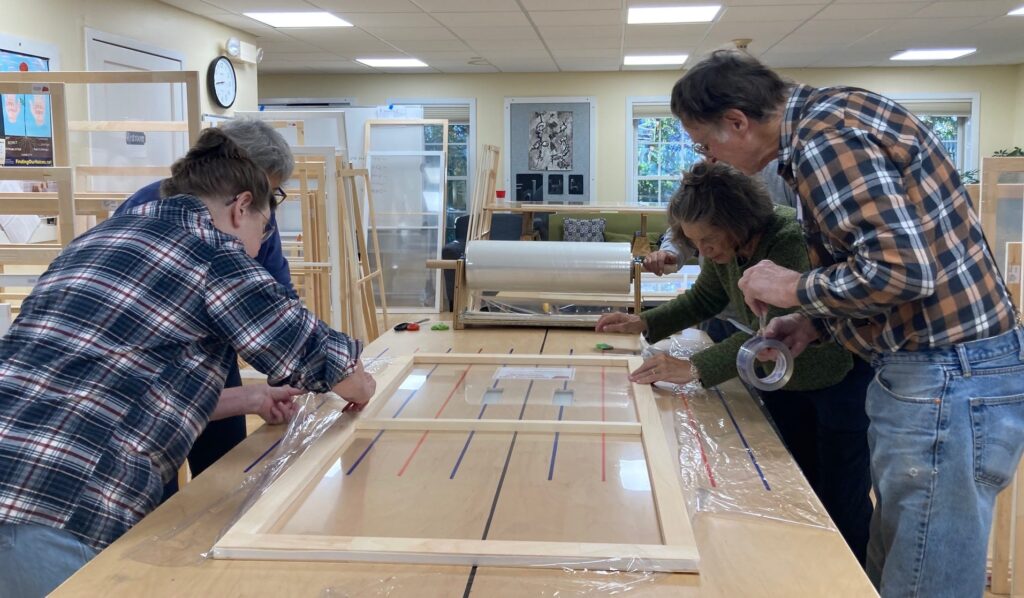Nine Unanswered Questions–Who’s Working Toward Answers?
Oct 31, 2023

We can’t turn back history, or turn our backs on our history: not what happened yesterday, last week, or last century.
We’re traveling on this spinning planet in challenging times.
In one week alone we’ve learned that storms can intensify to hurricanes in less than 24 hours, and that serial gunshots can break out amidst the clatter of toppling bowling pins 70 miles from our doorstep.
Our job as homo sapiens (sapiens—wise, sensible, judicious) is to process—grapple, absorb, distill—those events even as we spin forward. Then, find a wiser path.
How Many?
The nine questions that make up Dylan’s “Blowin in the Wind” maintain their hold for those of us fortunate to be living in Camden. The questions echo. Loudly.
If you haven’t heard the song in a while, take a moment, perhaps, to listen anew.
We are the species with free will and choice. And the species that knows (homo sapiens).
What have we done with this unique human capacity, and more importantly, what will we do with that capacity from this moment forward?
Not only do we need to answer “how many deaths?” concerning the killing of our own species—we also owe an answer for the thousands of other species whose extinction is directly linked to our warming planet.
Biodiversity loss and climate change go hand in hand, right at our doorstep. We’ve lost multiple bird and mammal populations, and according to the Maine Climate Council 38-55% of species will go extinct in the coming decades.
Asking “how many?” is a start. Even better is finding collective answers.
How do we answer these questions of climate change? First, recognize that the answers, like the questions, are interconnected. What we do regarding planetary warming will affect species—ours, and all the others who share the planet.
When apple trees blossom early—because of a warm spell—birds migrating on a “normal” schedule arrive after the blooms. This mismatch of migration and food availability causes species stress. This can lead to species die out.
When a marine species needs oxygenated water and it’s not available—due to excessive freshwater runoff, or because the water is warmer than ever—that species—eg. the Maine lobster—migrates to another region, or, dies off completely. (Excessive heat in Alaska recently caused a severe drop in crab population—read about it here.)
Our human species knows our planet is warming. We have ideas and solutions, pathways to mitigate the warming, to change our future. And the future of all species.
We can make different choices—they will change the planetary direction. We are the species that can do that. Our aim at CamdenCAN is to foster sharing these ideas, encouraging new paths forward.
Camden to Talk about Climate with Neighbors
CamdenCAN is proud to report that Camden is talking about the climate, within our community, and also with neighboring towns. As part of an energetic effort by the town to educate and prioritize climate planning, citizen’s group Camden Climate Action Now (CamdenCAN) is organizing a Camden Talks Climate series of events this winter, starting Thursday, Nov. 16, with “Camden’s Neighbors on Climate Action: Tales of Hope and Activism from Belfast to Vinalhaven (and Elsewhere!).”
What promises to be both an engaging and a highly informative event is being co-sponsored by the town itself and will take place from 6:30-8:30 pm in the French Conference Room on Washington Street. (Join meeting with this link. ) Camden’s own Esperanza Stancioff will moderate a panel discussion involving Islesboro’s Shey Conover, Vinalhaven’s Gabe McPhail, Belfast’s Jon Beal, Rockland’s Julie Hashem, and Rockport’s Bill Bow.
Camden was an early actor on the climate stage, installing a solar array on town property at Sagamore Farm and holding a series of instructive “Let’s Talk About Energy” online events during the pandemic. It is also bordered by communities that have taken steps, large and small, to actively prepare for climate change and resulting sea-level rise. The stories told by the panelists include victories and setbacks, personalities and pandemic stagnation, as well as successful adaptation of changes and plans that will make their communities climate resilient.
Come and learn from our neighbors about the opportunities for community climate action in preparation for developing Camden’s own climate action plan.
Upcoming CamdenCAN Events
11/2, 1-230 PM at the Camden Public Library. Join us for our biweekly Climate Conversation Circles—a facilitated, open, and ongoing space to explore eco-anxiety, share resources, and meet neighbors interested in finding ways to redirect the trends of the warming planet. No need to have attended other sessions. FMI see here.
11/7/23 0800 to 8 pm, Election Day Tabling—come join CamdenCAN members spreading the word at an election day table. You’ll get to meet other community members and share resources about reducing emissions, insulating homes, EV rebates, and solar options. Shifts of one or two hours (or any part thereof) are still available. Email reply to this newsletter to sign up.
11/16 1-230 PM at the Camden Public Library. Join us for our biweekly Climate Conversation Circles—a facilitated, open, and ongoing space to explore eco-anxiety, share resources, and meet neighbors interested in finding ways to redirect the trends of the warming planet. No need to have attended other sessions. FMI see here.
11/16, 630-830 pm (Thursday). French Conference Room/Camden Town Offices, Camden Talks Climate: “Camden’s Neighbors’ on Climate Action: Tales of Hope and Activism from Belfast to Vinalhaven (and Elsewhere!)” Panelists include Islesboro’s Shey Conover; Vinalhaven’s Gabe McPhail; Belfast’s Jon Beal; Rockland’s Julie Hashem; Rockport’s Bill Bow. Moderator: Esperanza Stancioff. Join meeting with this link. (Sponsored by CamdenCAN and the Town of Camden.)
12/7 630-800 pm (Thursday). Camden Public Library, Camden Talks Climate panel presentation, “Where Does Camden Stand on Climate Action?”
Other Camden Climate Issues and Events
Bay Chamber’s new building is stunning example for a zero emissions world. Bravo to this nonprofit for these choices. Read more here.
SAD 28 Heating System Woes. This election we are asked to vote on a $1.9 million bond to replace a failed geothermal system in our 15-year old elementary school. Some of us were surprised by the rapidity with which this came to our attention. As clean energy proponents we are disappointed by the chosen solution—three new propane boilers. This is a hugely complicated situation that has been brewing for years. We’re trying to get more informed about the heating/building solutions at all our district schools, so will be attending a meeting of the school board’s sustainability committee on 11/13 at 3:30—see the link here. We can’t let contractors off the hook for selling something that doesn’t work—and as citizens we’re wondering what the school will do when the costs of propane skyrocket as the true costs—the externalities—finally get included in the market price. Yes, the transition to clean energy is messy and complicated. Going back to fossil fuels—is that truly a sustainable longterm strategy for our schools? What message does that send to our children?
Energy audits aren’t the sexiest of home expenditures, but they are hugely useful benchmarks to understand the power plants known as our homes. Annie Ropiek—who is about to become a Camden community member (welcome Annie!)—wrote a great article last week explaining how to get to know your home’s energy profile (read it here). It feels good to tighten up your home—you’ll be sending less green house gas into the atmosphere (if you’re still burning fossil fuels). (And if you’re not still burning fossil fuels you’ll definitely want to insulate to ensure that your heat pump is efficient—not just pumping heat out your clapboards.) You can get up to 60% of the cost to insulate reimbursed (see here), and you’ll save monthly on heating costs. Oh, and a 30% tax credit due to the Inflation Reduction Action (see more here).
Curious about getting more species back into our harbor and rivers? Listen to this presentation by UNH professor Nathan Furey for the Megunticook River Citizen Advisory Committee.
Window Dressers is running an incredible window insert build this week at the Watershed School in Camden. There are still open slots to volunteer (here)—come meet your neighbors, have a great lunch, and see this marvelous nonprofit in action. (They will have built over 10,000 inserts this fall.) Thinking about getting some inserts for your home? Too late for this year, but not too early to contact them about next year. They make a big difference on your heating efficiency. (And pass the word to your friends in Vermont and New Hampshire, where community builds are also going on.) And to think it all started in Rockland….

Concluding Thoughts
Dylan was right, the answers are blowing in the wind.
And wind—caused by the unequal heating of the earth’s surface—itself is changing. How could it not be?—change one degree here, create an impact over there. A storm becoming a hurricane in 24 hours is a wind system on steroids, fueled by our warming oceans and atmosphere.
If we listen and watch, we can see and hear the answers. They are right in front of us.
Our species has commanded an oversize place on this planetary system, overreaching on resource use, burning fuel like it didn’t and doesn’t matter. Only now we know—we are homo sapiens, sapiens—that burning fossil fuels and warming our atmosphere does matter.
What different choices will we make from this moment on?
How many times can a man turn his head, and pretend that he just doesn’t see?
How many deaths will it take?
